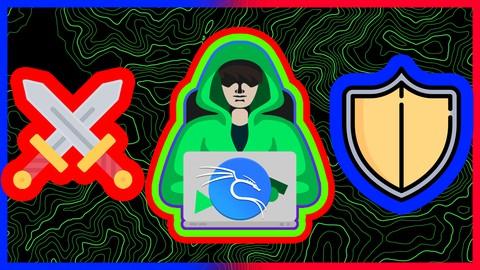Last Updated on November 14, 2024 by GeeksGod
Course : Real Ethical Hacking in 43 Hours: Certificated CSEH+CEH PRO
“`htmlUnlocking the World of Ethical Hacking Course: A Complete Guide
If you’ve ever wondered about the world of ethical hacking, then you’re in for a treat. An ethical hacking course can be the key to unpacking this fascinating field. Imagine being able to think like a hacker but use those skills for good. Ready to dive in? Let’s explore what ethical hacking is, how you can get started, and the benefits of taking an ethical hacking course.
What is Ethical Hacking?
Ethical hacking involves identifying and exploiting security vulnerabilities to improve an organization’s cybersecurity. Think of it as the digital equivalent of a security guard. Just as a guard checks for weaknesses in physical barriers, ethical hackers assess weaknesses in a system to strengthen it against cyber-attacks.
Also known as white hat hackers, these professionals are essential in today’s tech landscape. They ensure that your data remains safe and sound against cybercriminals, often referred to as black hat hackers. Despite sharing some techniques, ethical hackers work within the bounds of the law to safeguard information.
Why Take an Ethical Hacking Course?
The demand for cybersecurity professionals is skyrocketing. Companies are eager to hire experts who can defend their systems against attackers. Here are a few reasons why enrolling in an ethical hacking course is a smart move:
- Job Opportunities: The cybersecurity field is growing rapidly, with many organizations looking to bolster their defenses.
- High Earning Potential: Ethical hackers can command attractive salaries due to their specialized skills.
- Skill Development: An ethical hacking course will equip you with practical skills that make you a valuable asset for any organization.
- Continuous Learning: The cyber world evolves constantly, and this field offers endless opportunities to learn and grow.
- Fulfillment: You will be contributing to a safer digital world by protecting sensitive information.
Course Content Overview
So, what can you expect to learn in an ethical hacking course? Let’s break it down:
1. Basics of Ethical Hacking
Every journey begins with the basics. You’ll learn about different types of hacking, essential terminology, and the ethical principles that guide the practice.
2. Tools of the Trade
Get hands-on experience with popular hacking tools like Kali Linux and Wireshark. Just like an artist needs their brushes, ethical hackers need the right tools to perform their craft.
3. Hacking Phases
The course will cover various phases of hacking, including:
- Reconnaissance
- Scanning
- Gaining Access
- Maintaining Access
- Covering Tracks
4. Advanced Techniques
For those looking to take their skills to the next level, advanced topics such as web application hacking and social engineering are explored. This means learning how to deceive human psychology to gain sensitive information—think of it as the art of persuasion, but with a cybersecurity twist.
5. Defensive Measures
Understanding how to protect against common cyber attacks, such as denial-of-service attacks and malware infections, is crucial. You’ll learn the best practices to defend your systems effectively.
Finding Free Udemy Coupon for Ethical Hacking Course
Ready to kick off your ethical hacking journey? You might be thrilled to find that there are opportunities to access ethical hacking courses for free through Udemy. Keep an eye out for Free Udemy Coupons, as they can offer significant savings on courses without compromising quality.
The Curriculum of Ethical Hacking Courses
Most ethical hacking courses will cover essential subjects, including:
- Understanding and coding in programming languages like C++.
- Learning to build tools like keyloggers and network scanners.
- Grasping network security fundamentals.
- Exploring cryptography and its importance in securing data.
- Learning about penetration testing methodologies.
And don’t forget! Completing these courses typically results in a certification that proves your skills to potential employers.
Success Stories from Ethical Hacking Courses
Let’s consider a hypothetical scenario. Imagine John, a fresh graduate who was unsure about his career path. After taking an ethical hacking course, John secured an internship with a well-known cybersecurity firm. Within a year, he transitioned to a full-time position, turning his hobby into a lucrative career. Stories like John’s are common and serve as motivation for many entering the field.
The question many ask is, “Is ethical hacking right for me?” It doesn’t hurt to explore! Whether you’re a tech enthusiast or looking for a career shift, ethical hacking offers something for everyone.
Frequently Asked Questions about Ethical Hacking Courses
1. Who can enroll in an ethical hacking course?
Anyone interested in cybersecurity, from beginners to experienced IT professionals, can benefit from these courses.
2. Do I need prior experience in programming?
While programming knowledge is beneficial, many courses start from the basics, making them accessible to beginners.
3. What certifications can I achieve?
Many courses prepare you for certifications like Certified Ethical Hacker (CEH) or Certified Secure Ethical Hacker (CSEH+).
4. Are there opportunities for free coupons?
Yes! Keep an eye out for Free Udemy Coupons to access ethical hacking courses at no cost.
5. What tools will I learn to use?
You’ll learn to use tools like Kali Linux, Nmap, and many others, giving you hands-on experience.
Conclusion
Embarking on an ethical hacking course can be a transformative experience. With the demand for skilled individuals on the rise, there’s no better time to learn. By understanding vulnerabilities and protecting systems, you position yourself as a critical player in the cyber landscape. So why not take the leap? With free Udemy coupons and a wealth of online resources at your fingertips, your journey towards becoming a certified ethical hacker is more accessible than ever!
“`














